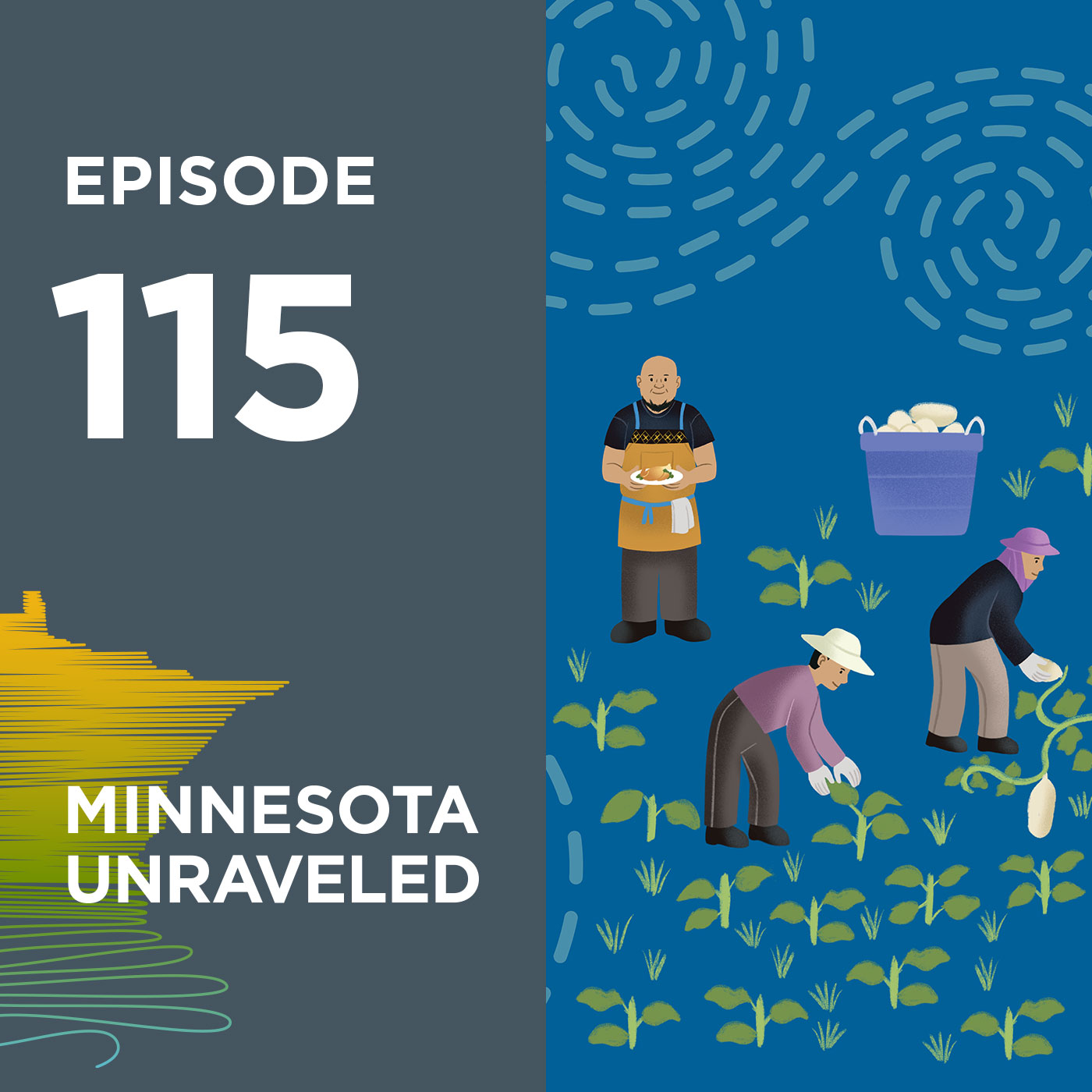Shared Roots: Hmong Foodways (episode 115)
Think of your favorite meal. It’s so much more than just what you see on the plate. It’s the history of the ingredients, the recipes passed down from family members, the memories you have with the tastes and smells of it all. For the Hmong community in Minnesota, food sits at the intersection of community tradition, culture, and history.
In this episode, historian and host Dr. Chantel Rodríguez speaks with three Hmong community members: Chef Yia Vang, of the restaurant Vinai, Pakou Hang, co-founder and executive director of the Hmong American Farmers Association (HAFA), and Zongxee Lee, a Hmong herbalist. In each conversation, guests share the role food and foodways have played in their families, and the ways they’re looking to carry that forward for future generations.

Transcripts
English Transcript PDF (323KB)
Guests

Zongxee Lee
Zongxee Lee is a Hmong herbalist, registered nurse, self-taught ethnobotanist, floral farmer, photographer, and author. Rooted in a lineage of Hmong herbalists and shamans, she self-published “30 Days of Purification” in 2016, a postpartum guide highlighting traditional Hmong plant medicine. She is the founder of Zooxis Conservatory and Botanical Garden LLC, a cultural and botanical initiative focused on researching DNA sequence of Hmong postpartum herbs, preserving, and educating about Hmong medicinal plants and holistic healing practices. Her work has been featured at national conferences and universities, bridging ancestral wisdom with modern wellness.
Alongside her mother, Mayyia Lee, and sister, Mhonpaj Lee, Zongxee helped launch Minnesota’s first culturally-based healing meals using traditional Hmong herbs, offering integrative care to patients. Through workshops, public exhibits, and seed-to-bloom storytelling, she continues to inspire communities to reconnect with healing tradition, plant by plant, story by story.

Pakou Hang
Pakou Hang was just 15 days old when her family immigrated to the United States. Born in a refugee camp in Thailand, her parents and older sister escaped Laos after the Secret War in Vietnam where her father had served as a captain. Once settled in Minnesota, the family would begin farming as a way to send Pakou and her six siblings to Catholic School. Starting with pickles, the family would grow cucumbers and send them off to the processor. Eventually growing their own produce to sell at the St. Paul and Minneapolis Farmers Markets, which they’ve now been doing for almost 30 years.
Pakou has a fierce passion for helping others and has a strong connection to rural places, farming, and food justice. She is the co-founder and prior executive director of the Hmong American Farmers Association, a membership-based, community-centered, equity-driven nonprofit. Currently she serves as the vice president of the Northwest Area Foundation, an organization dedicated to funding changemarkers working to advance racial, social and economic justices in eight states and 76 Native nations. And she can still be found on her family farm tending to their orchard of 1000 fruit trees.

Chef Yia Vang
Yia Vang is the Executive Chef and Owner at Vinai, a new restaurant in Minneapolis, MN that honors the past, present, and future of Hmong cooking. Vang is a trained chef with extensive experience at top restaurants across the Twin Cities. In 2016, Vang started nationally acclaimed Union Hmong Kitchen, a restaurant that features Hmong culture, stories, rituals, foods and flavors that quickly became a community staple in Minnesota. In July 2024, Vang opened Vinai, to serve as a love letter to his parents. Vang spearheads the kitchen at the restaurant and crafts a menu that features classic Hmong dishes that entice people to grab a seat at the table and open their minds to new experiences. Vang has been featured in The New York Times, National Geographic, and Bon Appétit, as well as showcased on PBS, CNN, among others. Most recently, Vinai was featured on The New York Times’s 2024 50 Best Restaurant List, Eater’s 2024 Best New Restaurants in America, and Esquire’s 2024 Best New Restaurants in America with Vang being recognized as Chef of the Year.
Photo
50 Years of Hmong in Minnesota (Chef Yia Vang and farmer detail) ©️ Alex Yang Art
Primary Sources
Hmong Oral History Project. Minnesota Historical Society. https://collections.mnhs.org/search/collections/record/957d1892-e465-40b2-aa75-5a7bfdfdbec3
The Hmong Oral History Project consists of nine interviews with Hmong men and women from the Twin Cities who have immigrated to Minnesota from Laos or Thailand. The interviews are made up of personal stories that describe their experiences both before and after their immigration. These interviews are the work of Charles Numrich, Linda Rossi and translator May Herr. The interviews, transcription and editing were completed by this team of people. Tapes and transcripts from this project were donated to the Minnesota Historical Society.
Hmong Women's Action Team Oral History Project. Minnesota Historical Society. https://collections.mnhs.org/search/collections/record/cf2623f7-22e6-474a-93d3-d8bf8459ac86
The Hmong Women’s Action Team Oral History Project consists of 18 interviews of Hmong women from three generations and from six different families. They discuss the accomplishments of Hmong women in Laos and the United States and the changing roles of Hmong women in the home and the community. All but one interview were conducted predominantly in Hmong. The interviews were transcribed and then translated into English. The transcripts include both the English translation and the Hmong.
Minnesota Ethnic History Project. Project Records. Minnesota Historical Society. https://www2.mnhs.org/library/findaids/00260.xml
Folders specific to Hmong community -- general, churches, Dept. of Public Welfare, Lao Family Community notes and chapter drafts, newspaper articles, research and interview notes, statistical data, and other related material created by the Minnesota Ethnic History Project.
Secondary Sources
Alkon, Alison Hope and Kat Vang. “Boiled Chicken and Pizza: The Making of Transnational Hmong American Foodways.” In The Immigrant-Food Nexus: Borders, Labor, and Identity in North America, edited by Julian Agyeman and Sydney Giacalone, 261–80. The MIT Press, 2020.
Budiman, A. “Hmong in the U.S. fact sheet.” Pew Research Center. April 29, 2021. Retrieved on December 14, 2023 from https://www.pewresearch.org/social-trends/fact-sheet/asian-americans-hmong-in-the-u-s/
Cha, Dia. Hmong American Concepts of Health, Healing, and Conventional Medicine. Routledge, 2003.
de la Peña, Carolyn, and Benjamin N. Lawrance. “Introduction: Foodways, ‘Foodism,’ or Foodscapes? Navigating the Local/Global and Food/Culture Divides.” In Local Foods Meet Global Foodways, 1st ed., edited by Carolyn de la Peña and Benjamin N. Lawrance, 2–14. Routledge, 2012. doi:10.4324/9780203723500-1.
Dubost, Jean Marc, Chiobouaphong Phakeovilay, Chithdavone Her, Audrey Bochaton, Elizabeth Elliott, Eric Deharo, Mouachan Xayvue, Somsanith Bouamanivong, and Geneviève Bourdy. “Hmong Herbal Medicine and Herbalists in Lao PDR: Pharmacopeia and Knowledge Transmission.” Journal of Ethnobiology and Ethnomedicine 15, no. 27 (2019): 1-15. doi:10.1186/s13002-019-0307-2.
Faruque, Cathleen Jo. “Migration of Hmong to Rochester, Minnesota: Life in the Midwest.” Hmong Studies Journal 4 (2003): 1-50. https://www.hmongstudiesjournal.org/uploads/4/5/8/7/4587788/faruquehsj42003.pdf
Hang, Pakou. "Hmong American Farmers Association." MNopedia, Minnesota Historical Society. http://www.mnopedia.org/group/hmong-american-farmers-association
Hillmer, Paul. A People’s History of the Hmong. Minnesota Historical Society Press, 2010.
“Hmong Culture and Foods.” Minnesota Department of Health. January 2025. https://www.health.state.mn.us/docs/people/wic/localagency/culture/hmong.pdf#:~:text=Each%20special%20Hmong%20herb%20%E2%80%9Ctshuaj%E2%80%9D%20which%20translates,to%20each%20new%20mother's%20taste%20and%20preference.&text=Consuming%20Hmong%20postpartum%20(chicken)%20diet%20for%2030,herbs%20to%20help%20with%20cleansing%20the%20uterus
“Hmong in Minnesota Timeline.” Minnesota Historical Society. https://www.mnhs.org/hmong/hmong-timeline
Kolnick, Jeff. "Land, Labor, the Market, and Politics." MNopedia, Minnesota Historical Society. http://www.mnopedia.org/land-labor-market-and-politics
Kong, Jacqui. “Feasting on ‘The Other’: Performing Authenticity and Commodifying Difference in Celebrity Chefs’ Food and Travel Television Programmes.” In Routledge Handbook of Food in Asia, edited by Cecilia Leong-Salobir, 207-221. Routledge, 2019. https://doi-org.ezp3.lib.umn.edu/10.4324/9781315617916
Lauerman, Connie. “Back to the Land: For the Hmong of Minnesota, Farming is a Way to Recapture their Paradise Lost.” Chicago Tribune Magazine. October 1, 1989.
Lee, Mai Na M. "Hmong and Hmong Americans in Minnesota." MNopedia, Minnesota Historical Society. http://www.mnopedia.org/hmong-and-hmong-americans-minnesota
Lor, Kajua B, Sakura Moua, and Eric J. Ip. “Frequency and Perceptions of Herbal Medicine Use Among Hmong Americans: A Cross Sectional Survey.” Journal of Immigrant and Minority Health 18, no. 2 (2016): 397–401. doi:10.1007/s10903-015-0190-4.
Mohamud, Yasin. “How Minnesota’s Hmong American Farmers got Organized.” MinnPost. November 18, 2017. https://www.minnpost.com/community-sketchbook/2017/11/how-minnesotas-hmong-american-farmers-got-organized/
Ronnigen, Barbara J. "Estimates of Immigrant Populations in Minnesota.” Working Paper 99-16. State Demographic Center. May 1999. https://mn.gov/admin/assets/estimates-of-immigrant-populations-msdc-may1999_tcm36-76617.pdf
Scripter, Sami, and Sheng Yang. Cooking from the Heart: The Hmong Kitchen in America. New edition. University of Minnesota Press, 2009. http://www.jstor.org/stable/10.5749/j.ctttv3kj.
Spring, Marline A. “Ethnopharmacologic Analysis of Medicinal Plants Used by Laotian Hmong Refugees in Minnesota.” Journal of Ethnopharmacology 26, no. 1 (1989): 65–91. doi:10.1016/0378-8741(89)90114-1.
Vang, Chia Youyee. Hmong America : Reconstructing Community in Diaspora. University of Illinois Press, 2010.
_______________. Hmong in Minnesota. Minnesota Historical Society Press, 2008.
Vue, Wa, Cindy Wolff, and Keiko Goto. “Hmong Food Helps Us Remember Who We Are: Perspectives of Food Culture and Health among Hmong Women with Young Children.” Journal of Nutrition Education and Behavior 43, no. 3 (2011): 199–204. doi:10.1016/j.jneb.2009.10.011.
Yang, Hongyan. “Cooking in the Hmong Cultural Kitchen.” In Routledge Handbook of Food in Asia, edited by Cecilia Leong-Salobir, 89-105. Routledge, 2019. https://doi-org.ezp3.lib.umn.edu/10.4324/9781315617916
 MNHS Podcast
Jun 12, 2025 6:00:00 AM
MNHS Podcast
Jun 12, 2025 6:00:00 AM

